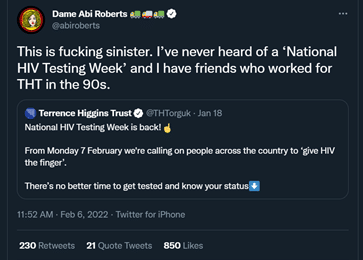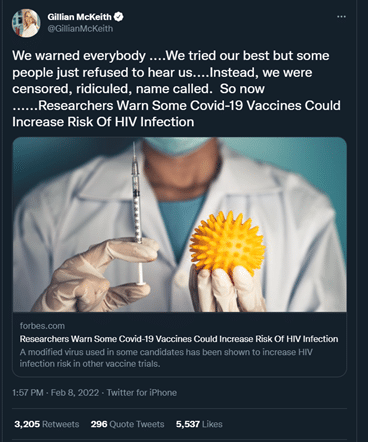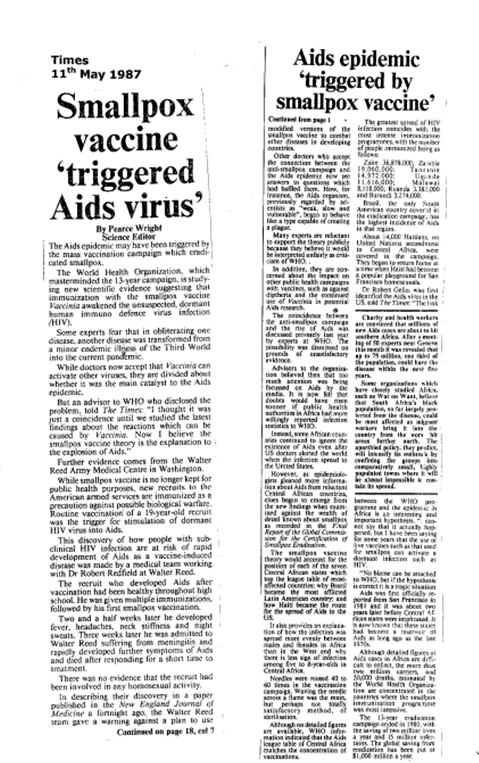This week is HIV testing week – an awareness week that has been running since 2012. If you turn to social media, though, you might be under the impression that this initiative is only running due to the COVID vaccination programme.

Other tweeters more explicitly link a rise in HIV cases to the SARS-CoV-2 vaccines, with one stating:
So let me get this straight – they added a tiny fragment of hiv into the vaccine as a clamp for the protein or whatever the fuck, injected people with it, now a year later they’re saying hiv is on the rise & make sure to get tested while they make a hiv vaccine [clown emoji]
While other Twitter users made worrying claims about how a test positive for HIV might affect your life, with one guy who advertises his Bitchute show in his bio explaining:
They are gonna try and test everyone for HIV aren’t they. A positive test will ban you from breeding. Think about it.
For the avoidance of doubt, you can have children if you are HIV+ as long as you get the right treatment to protect in utero transmission.
When those Twitter users shared information, they claim support these conspiratorial ideas, it was often either a video snippet from the BBC, or a news article from October 2020.
The BBC video shared by numerous conspiracy–minded social media users talked about how the vaccine for COVID-19 could be made using a fragment taken from HIV. The snippet explains that the COVID-19 spike protein needs stabilising in the lab by using a “molecular clamp” which is a “tiny fragment of HIV”. The clipped video ends there. It doesn’t take much work to find the source of the clip – it’s taken from a BBC Horizon Special episode on The Vaccine. In the full clip, the scientist – Dr Keith Chappell from University of Queensland, Australia –makes sure to say very clearly that the protein clamp that they use in this protein vaccine is very well studied, very stable and has absolutely no risk of HIV replication.
But wait – protein vaccine? No, I didn’t make a typo. The University of Queensland have been working on protein vaccines for COVID-19. So far, in the UK we are using mRNA vaccines like those from Pfizer and Moderna, or vector vaccines like the Oxford vaccine. Protein vaccines are a different sort of technology – a more traditional form of immunisation technology. While the mRNA and vector vaccines ask our bodies to make the COVID-19 spike protein for themselves, protein vaccines take a lab-generated version of the spike protein and expose our immune systems to it. This is why the lab needed the molecular clamp, because the COVID-19 protein isn’t very stable on its own.
Unfortunately, this vaccine never got past the trial phase, because they discovered that the presence of this molecular clamp was enough to give false positive test results to HIV testing. That is not to say that it gave people HIV – the virus wasn’t present and so there was nothing to cause infection or last for any length of time in the body –but it did trick HIV tests in to presenting as if there were HIV in the body. Even though it didn’t risk making anyone sick, it did risk people getting scary test results that weren’t true, and risked extra confusion and uncertainty that no one needs. Accordingly, the lab pulled their vaccine. This vaccine has never been used beyond the 216 phase one trial participants in Australia. It has never been used in the UK.
So no, if there is a rise in HIV cases since COVID-19 (we’ll come back to that claim), it’s not because of this vaccine.
The October 2020 articles
Many people linking the COVID-19 vaccines to a rise in HIV cases cite articles from Forbes and The New York Post from early in the pandemic. Among those posting these articles was Gillian McKeith, the “holistic nutritionist” who was told by advertising watchdogs in 2007 to stop using the title “Doctor”:

The articles, from way back in October 2020, reference a letter published in The Lancet around the same time, from a number of researchers warning that a certain type of viral vector vaccine could potentially be risky. The warning was based on previous data from a 2008 HIV vaccination study, in which researchers used a viral vector similar to (but crucially not the same as) the Oxford vaccine.
Viral vector vaccines use a broken form of a common virus, like adenoviruses which normally cause cold-like symptoms, to carry in the information the body needs to generate immunity to whatever disease the vaccine is made to prevent. These viral vectors are modified so they are not infectious and do not cause symptoms.
In the 2008 study, instead of using a chimp adenovirus vector as Oxford did for their COVID-19 vaccine, the researchers used human adenovirus serotype 5 (Ad5). Some researchers don’t like to use Ad5 for vaccines, because it’s a really common virus naturally which means many of us are already immune to it. That means instead of taking in the information to develop an immune response, our body fights off the vector and the vaccine is less effective.
The 2008 study showed that when Ad5 was used in an HIV vaccine in people who had previously had developed natural immunity to Ad5, it increased their risk of contracting HIV. Crucially this data was shown in men, who were uncircumcised, who had a previous immune response to Ad5 and who had penis-in-anus sex with someone who was HIV1 positive. A very small subset of people, but enough to make some researchers recommend caution when using Ad5 in viral vector vaccines.
All of this was before the first vaccine approval, so is it relevant now? In the UK, no. None of the vaccines that are approved for use in the UK, or approved for use for travel to the UK, are Ad5-based viral vector vaccines.
What’s also important to note is that even if a vaccine does increase your risk of contracting HIV – something we have no evidence for apart from in those very specific HIV vaccines from over a decade ago – they cannot give you HIV. It just means that if you encounter a situation where you were already at risk of contracting HIV, then you’re at a slightly higher risk of actually contracting it.
Is HIV infection even on the increase?
Claims that HIV cases are increasing hinge on two news stories. The first is one which talks about how heterosexual diagnosis of HIV has surpassed homosexual diagnosis of HIV for the first time in a decade. Writing for The Guardian, Ian Green chief executive of the Terrence Higgins Trust wrote:
“Now, 49% of new diagnoses in England are among straight people (with an almost even split between men and women), compared with 45% for gay and bisexual men.”
He went on to explain that this isn’t because of a total increase in cases of HIV, rather the fact that diagnosis of HIV in gay and bisexual men has rapidly dropped in the last eight years – a fact which is largely attributed to the wide availability and use of pre-exposure prophylaxis in this demographic group. Ian Green calls for a change in how we communicate HIV risk so that people from all backgrounds get tested.
The second story is one in which a new variant has been identified in The Netherlands. Some Twitter users have claimed that this variant could be down to COVID-19 vaccines.
![tweet from Twitter user @danielmarven which reads “They see now Covid no longer making money as they planned, Now they have to revive HIV varients [sic]. We really need to call this fake scientist and their pharmaceutical companies into order”. The tweet shares another from eNCAnews which discusses the VB variant identified in the Netherlands.](https://www.skeptic.org.uk/wp-content/uploads/2022/02/daniel.png)
In posting article from The New York Post, one Twitter user added:
Here it comes…the cover up. You all realize that HIV has been shown to be IN the injections, right? So when people drop from #VAIDS they will blame it on this ‘new HIV strain’ rather than the real source….
However, as the article itself explained:
The earliest appearance of the variant was detected in someone diagnosed in 1992 who had an early version of the variant, and the most recent was from 2014.
It’s pretty conclusive that the new variant can’t have anything at all to do with vaccine developed thirty years later, and Reuters FactCheck have thoroughly debunked this claim.
Smallpox vaccine
This isn’t the first time HIV has been linked to a vaccine. Posts circulating around conspiracy Telegram groups, including Merseyside Resistance, claim that the smallpox vaccine caused the AIDS outbreak. One particular post shared copies of two newspaper cuttings of an article from 11th May 1987. The article headline reads “Smallpox vaccine ‘triggered Aids virus’”.

The source of these cuttings is a national HIV prevention website from Ireland which, among much other information, maintains an archive of historic media coverage of the HIV/AIDS epidemic, and the PDF where these cuttings are maintained include many more articles describing the absurdity of these claims. In the many decades since the first cases of human HIV infection, we have come to understand that HIV is caused by a virus which, like many viruses, originated in another animal and evolved to infect humans. There is absolutely no evidence linking any vaccine to the onset of HIV infection in humans.
Easily fact-checked
In writing this story I spent a long time looking at various Twitter opinions about HIV and COVID-19 and found myself feeling increasingly frustrated. Everything I’ve presented here is really easy to fact check. In many cases the science was right there in the main text of the articles these conspiracy theorists were sharing as “proof” that their claims were correct.
In the age of the COVID-19 pandemic, our communication of science is better than ever, but this is about more than science. People often turn to conspiracy theories at uncertain times in their lives, and for many these beliefs become a source of community and support through periods of difficulty and loneliness.
As conspiracy theorists share claims that science can easily debunk, it is easy to assume that their beliefs are “anti-science”. In reality, often the ‘science’ is inconsequential. The claims will pivot from a dismissal of “mainstream media” in one breath, while sharing BBC Horizon clips and Forbes articles in the next.
Conspiracism is a belief system that can become a core identity; it’s this combination of identity, belief and cognitive bias that can seem insurmountable. The answer, in my opinion, goes beyond science. We must be compassionate and understanding of how scientific misunderstanding and misinformation can feed into a belief system; how even accurate scientific information can be twisted to suit a conspiratorial agenda; and how challenging those core conspiracy beliefs requires a far more complex solution than simply countering the misinformation with ‘science’ and ‘facts.



